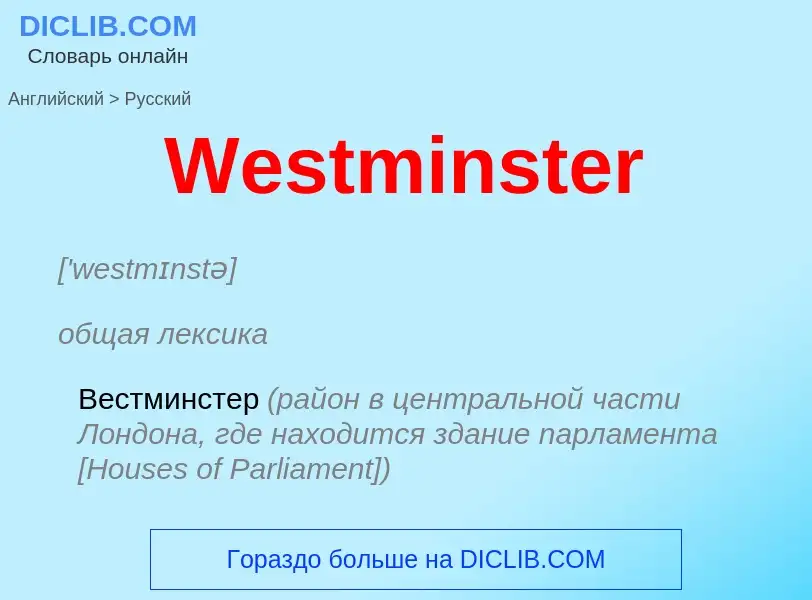Μετάφραση και ανάλυση λέξεων από την τεχνητή νοημοσύνη ChatGPT
Σε αυτήν τη σελίδα μπορείτε να λάβετε μια λεπτομερή ανάλυση μιας λέξης ή μιας φράσης, η οποία δημιουργήθηκε χρησιμοποιώντας το ChatGPT, την καλύτερη τεχνολογία τεχνητής νοημοσύνης μέχρι σήμερα:
- πώς χρησιμοποιείται η λέξη
- συχνότητα χρήσης
- χρησιμοποιείται πιο συχνά στον προφορικό ή γραπτό λόγο
- επιλογές μετάφρασης λέξεων
- παραδείγματα χρήσης (πολλές φράσεις με μετάφραση)
- ετυμολογία
Westminster - translation to Αγγλικά
['westmɪnstə]
общая лексика
Вестминстер (район в центральной части Лондона, где находится здание парламента [Houses of Parliament])
английский парламент
сокращение
от Westminster Hall
от Westminster School
разговорное выражение
(бывший) воспитанник Вестминстер-Скул [Westminster School]
синоним
существительное
общая лексика
Вестминстер (район Лондона)
английский парламент
Вестминстер
['westmɪnstə,mɔdl]
общая лексика
вестминстерская модель (система британского парламентаризма, обыкн. на двухпартийной основе, кот. правящие круги Великобритании стремились насадить в доминионах и бывших колониях)
['nju:'wes(t)minstə]
география
г. Нью-Вестминстер
Βικιπαίδεια

Westminster is a city and area of Central London, England, within the larger City of Westminster, most notable for being the seat of the majority of government institutions in the United Kingdom.
The area, which extends from the River Thames to Oxford Street, has many famous landmarks, including the Palace of Westminster, Buckingham Palace, Westminster Abbey, Westminster Cathedral, Trafalgar Square and much of the West End shopping and entertainment district.
The name (Old English: Westmynstre) originated from the informal description of the abbey church and royal peculiar of St Peter's (Westminster Abbey), west of the City of London (until the English Reformation there was also an Eastminster, near the Tower of London, in the East End of London). The abbey's origins date from between the 7th and 10th centuries, but it rose to national prominence when rebuilt by Edward the Confessor in the 11th. Westminster has been the home of England's government since about 1200, and from 1707 the Government of the United Kingdom. In 1539, it became a city.
Westminster is often used as a metonym to refer to the Parliament of the United Kingdom, in the Palace of Westminster.


![St Peter's Abbey at the time of Edward's funeral, depicted in the [[Bayeux Tapestry]] St Peter's Abbey at the time of Edward's funeral, depicted in the [[Bayeux Tapestry]]](https://commons.wikimedia.org/wiki/Special:FilePath/BayeuxTapestryScene26.jpg?width=200)


![[[Westminster City Hall]], completed in 1965 [[Westminster City Hall]], completed in 1965](https://commons.wikimedia.org/wiki/Special:FilePath/Westminster City Hall, Victoria Street SW1 - geograph.org.uk - 1284668.jpg?width=200)
![Westbourne]] formed part of the western boundary, and [[Oxford Street]] the north Westbourne]] formed part of the western boundary, and [[Oxford Street]] the north](https://commons.wikimedia.org/wiki/Special:FilePath/Westminster Civil Parish Map 1870.png?width=200)



![Sansad Bhavan]] (Parliament House) building in [[New Delhi, India]] Sansad Bhavan]] (Parliament House) building in [[New Delhi, India]]](https://commons.wikimedia.org/wiki/Special:FilePath/New Delhi government block 03-2016 img3.jpg?width=200)




![Residences in New Westminster near the [[Fraser River]] in 2020 Residences in New Westminster near the [[Fraser River]] in 2020](https://commons.wikimedia.org/wiki/Special:FilePath/Colourful Boxes (50208150566).jpg?width=200)
![Moody likened his vision of the nascent Colony of British Columbia to the pastoral scenes painted by [[Aelbert Cuyp]]. Moody likened his vision of the nascent Colony of British Columbia to the pastoral scenes painted by [[Aelbert Cuyp]].](https://commons.wikimedia.org/wiki/Special:FilePath/Cuyp, Aelbert - Cattle near the Maas, with Dordrecht in the distance - Google Art Project.jpg?width=200)
![An Expo Line train approaching [[New Westminster station]] An Expo Line train approaching [[New Westminster station]]](https://commons.wikimedia.org/wiki/Special:FilePath/Mark II Expo Line train, March 2019.jpg?width=200)
![May Day celebrations in 1913. Young girls dance around a [[maypole]]. May Day celebrations in 1913. Young girls dance around a [[maypole]].](https://commons.wikimedia.org/wiki/Special:FilePath/MayDay1913.jpg?width=200)



![[[New Westminster Bridge]] [[New Westminster Bridge]]](https://commons.wikimedia.org/wiki/Special:FilePath/New-westminster.rail-bridge.jpg?width=200)
![A view of New Westminster from the [[Fraser River]], c. 1865 A view of New Westminster from the [[Fraser River]], c. 1865](https://commons.wikimedia.org/wiki/Special:FilePath/NewWestminsterFraserRiver1865.jpg?width=200)

.jpg?width=200)

